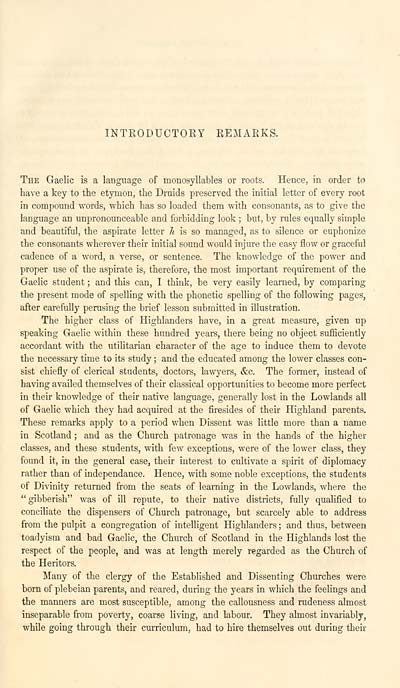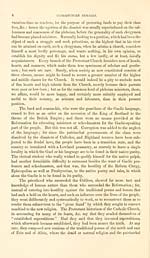Download files
Complete book:
Individual page:
Thumbnail gallery: Grid view | List view

INTRODUCTOEY REMARKS.
The Gaelic is a language of monosyllables or roots. Hence, in order to
have a key to the etymon, the Druids preserved the initial letter of every root
in compound words, which has so loaded them with consonants, as to give the
language an unpronounceable and forbidding look ; but, by rules equally simple
and beautiful, the aspirate letter h is so managed, as to silence or euphonize
the consonants wherever their initial sound would injure the easy flow or graceful
cadence of a word, a verse, or sentence. The knowledge of the power and
proper use of the aspirate is, therefore, the most important requirement of the
Gaelic student ; and this can, I think, be very easily learned, by comparing
the present mode of spelling with the phonetic spelling of the following pages,
after carefully perusing the brief lesson submitted in illustration.
The higher class of Highlanders have, in a great measure, given up
speaking Gaelic within these hundred years, there being no object sufficiently
accordant with the utilitarian character of the age to induce them to devote
the necessary time to its study ; and the educated among the lower classes con-
sist chiefly of clerical students, doctors, lawyers, &c. The former, instead of
having availed themselves of their classical opportunities to become more perfect
in their knowledge of their native language, generally lost in the Lowlands all
of Gaelic which they had acquired at the firesides of their Highland parents.
These remarks apply to a period when Dissent was little more than a name
in Scotland ; and as the Church patronage was in the hands of the higher
classes, and these students, with few exceptions, were of the lower class, they
found it, in the general case, their interest to cultivate a spirit of diplomacy
rather than of independance. Hence, with some noble exceptions, the students
of Divinity returned from the seats of learning in the Lowlands, where the
" gibberish" was of ill repute, to their native districts, fully qualified to
conciliate the dispensers of Church patronage, but scarcely able to address
from the pulpit a congregation of intelligent Highlanders ; and thus, between
toadyism and bad Gaelic, the Church of Scotland in the Highlands lost the
respect of the people, and was at length merely regarded as the Church of
the Heritors.
Many of the clergy of the Established and Dissenting Churches were
born of plebeian parents, and reared, during the years in which the feelings and
the manners are most susceptible, among the callousness and rudeness almost
inseparable from poverty, coarse living, and labour. They almost invariably,
while going through their curriculum, had to hire themselves out during their
The Gaelic is a language of monosyllables or roots. Hence, in order to
have a key to the etymon, the Druids preserved the initial letter of every root
in compound words, which has so loaded them with consonants, as to give the
language an unpronounceable and forbidding look ; but, by rules equally simple
and beautiful, the aspirate letter h is so managed, as to silence or euphonize
the consonants wherever their initial sound would injure the easy flow or graceful
cadence of a word, a verse, or sentence. The knowledge of the power and
proper use of the aspirate is, therefore, the most important requirement of the
Gaelic student ; and this can, I think, be very easily learned, by comparing
the present mode of spelling with the phonetic spelling of the following pages,
after carefully perusing the brief lesson submitted in illustration.
The higher class of Highlanders have, in a great measure, given up
speaking Gaelic within these hundred years, there being no object sufficiently
accordant with the utilitarian character of the age to induce them to devote
the necessary time to its study ; and the educated among the lower classes con-
sist chiefly of clerical students, doctors, lawyers, &c. The former, instead of
having availed themselves of their classical opportunities to become more perfect
in their knowledge of their native language, generally lost in the Lowlands all
of Gaelic which they had acquired at the firesides of their Highland parents.
These remarks apply to a period when Dissent was little more than a name
in Scotland ; and as the Church patronage was in the hands of the higher
classes, and these students, with few exceptions, were of the lower class, they
found it, in the general case, their interest to cultivate a spirit of diplomacy
rather than of independance. Hence, with some noble exceptions, the students
of Divinity returned from the seats of learning in the Lowlands, where the
" gibberish" was of ill repute, to their native districts, fully qualified to
conciliate the dispensers of Church patronage, but scarcely able to address
from the pulpit a congregation of intelligent Highlanders ; and thus, between
toadyism and bad Gaelic, the Church of Scotland in the Highlands lost the
respect of the people, and was at length merely regarded as the Church of
the Heritors.
Many of the clergy of the Established and Dissenting Churches were
born of plebeian parents, and reared, during the years in which the feelings and
the manners are most susceptible, among the callousness and rudeness almost
inseparable from poverty, coarse living, and labour. They almost invariably,
while going through their curriculum, had to hire themselves out during their
Set display mode to: Large image | Transcription
Images and transcriptions on this page, including medium image downloads, may be used under the Creative Commons Attribution 4.0 International Licence unless otherwise stated. ![]()
| Early Gaelic Book Collections > Blair Collection > Treatise on the language, poetry, and music of the Highland clans > (15) |
|---|
| Permanent URL | https://digital.nls.uk/76236568 |
|---|
| Description | A selection of books from a collection of more than 500 titles, mostly on religious and literary topics. Also includes some material dealing with other Celtic languages and societies. Collection created towards the end of the 19th century by Lady Evelyn Stewart Murray. |
|---|
| Description | Selected items from five 'Special and Named Printed Collections'. Includes books in Gaelic and other Celtic languages, works about the Gaels, their languages, literature, culture and history. |
|---|

